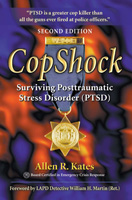
CopShock: Second Edition
Surviving Posttraumatic Stress Disorder (PTSD)
by Allen R. Kates, MFAW, BCECR
Retirement
A law enforcement officer’s retirement is a major life event. Everything he or she is and has worked for seems to suddenly come to an end. This may result in depression and trigger memories of traumatic experiences long buried. An officer must prepare for a successful retirement. People who are not police officers will also benefit from the resources described below.
Police Retiree
Handbook
Although you may not be part of the Fairfax County
Police Officers Retirement System in Virginia, that county’s retiree handbook
published online is an excellent resource for police retirees everywhere. It
provides questions to ask before retirement and what to do after leaving the
force.
Go to: http://www.fairfaxcounty.gov/retirement.
Then click on the appropriate retirement information.
For retirement benefits from Social Security, be sure to call at
least three months before retirement: 800-772-1213.
POPPA Retiree
Program
POPPA volunteer retirees trained as PSOs answer the
24-hour Retiree Help-Line covering the New York Metro area and other states.
They help retirees with stress and trauma related problems and refer them to
competent professionals, as PTSD can be debilitating long after
retirement.
Go to: http://www.poppainc.com. Phone: 800-599-1085.
Retired Peace Officers
Association of California (RPOAC)
All retired peace officers,
in or out of California, are eligible for membership in RPOAC, a watchdog
organization dedicated to protecting retired peace officers’ interests,
especially benefits. It operates through the Peace Officers Research Association
of California (PORAC) and the National Association of Police Organizations
(NAPO) in Washington, DC. PORAC conducts critical incident stress and
line-of-duty death seminars.
Go to: http://www.rpoac.org. Write: RPORAC,
PO Box 1239, Colfax, CA 95713. Call toll-free: 800-743-7622.
Retirement Pilot
Study
Psychologist Daniel A. Goldfarb runs a counseling
center for Long Island Law Enforcement. In this pilot study, he attempts to
predict retirement satisfaction in police officers. Dr. Goldfarb comments on
retired officers who show signs of stress, depression and anxiety.
To
examine this study, go to: http://www.heavybadge.com. Then click on the “retirement” button. Dr. Goldfarb
says that he is surprised at the level of stress experienced by retiring and
retired cops. He is reminded of the old saying: “If you are what you do, and you
don’t, you AIN’T!” But the results are not as bad as they sound. It seems that
if officers prepare for their retirement, then things usually go
well.
Retirement
Test
While reviewing Dr. Goldfarb’s study just mentioned, you
will notice a button that says “Take the Test.” Go for it, and you may find out
how ready you are for retirement.
Go to:
http://www.heavybadge.com, and click
on the “Retirement” button.
10-13 Clubs of
America
The 10-13 Club is a national organization of retired
New York City police officers. It is dedicated to “protecting, preserving and
pursuing the rights” of the retiree.
Go to: http://www.ny10-13amer.org. For New
York, write: New York 10-13 Association, 260-09 Hillside Avenue, Floral Park, NY
11004. Phone: 718-343-7271. For Florida, write: 10-13 Clubs of America, P.O. Box
1013, Lecanto, FL 34460. Phone: 352-527-0347.